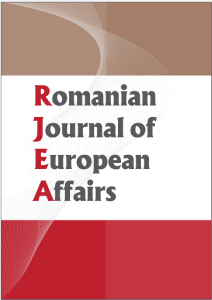Accession is, above All, about Benefits
Jacques Pelkmans
Abstract:
Accession is about prosperity and, in this context, all candidate countries should be confident in their opportunities in the process of becoming full members of the European Union. It is crucial that decision makers of such countries dispose of profound and analytically respectable ‘impact studies’ on horizontal and sectoral subjects. Such studies should aim to clarify analytically what the acquis implies for sectors or broader themes and attempt to build models or scenarios helping to understand the nature and magnitude of short term and longer term effects of adjusting to the acquis or indeed exploiting its opportunities to the full.
Keywords: domestic benefit, social shock, transition
The Migration Phenomenon from the Perspective of Romanian’s Accession to the European Union
Daniela-Lumini?a Constantin, Valentina Vasile, Diana Preda, Lumini?a Nicolescu
Abstract:
This work represents a brief version of the research devoted to the migration phenomenon in the context of Romania’s accession to the European Union, as Study no. 5, included in the PAIS II project. The complexity of such issue has necessarily induced an inter-disciplinary approach that mainly includes an institutional-legislative dimension, a sociological dimension and an economic-statistical dimension, the last one representing the paper’s distinctive note, since it particularly contributes to the identification of the possible and necessary objectives of migration policies, based on the present and future realities.
Keywords: harmonization, labour market, migration, mutual recognition
A Perspective on Insolvency Procedures in the Romanian Economy
Daniel Dăianu, Drago? Păslaru, Liviu Voinea
Abstract:
In the process of EU integration, the key criterion2) Romania has to meet is the economic one, which presupposes a functioning market economy. Even though the concept of functioning market economy is rather ambiguous and judgmental, there is a wide consensus that market exit constitutes one of the main characteristics of a market economy, in the sense that there should not be any legal, administrative, and political or other type of barriers to market exit for the loss-making companies. The market exit process is mainly defined by the institution of bankruptcy, which plays an important role in the reallocation of resources and the improving of the business environment. Starting from the perspective of Romania becoming an EU member, and from the need to develop a healthy domestic economy, this study makes an attempt to evaluate bankruptcy procedures. It tries to explain the current situation and to suggest possible developments that may contribute to upgrading the competitiveness and the functionality of the Romanian economy.
Keywords: bankruptcy, insolvency regime
State Aid to the Romanian Steel and Coal Sectors: Issues Related to Accession
Isabela Atanasiu, Gheorghe Oprescu
Abstract:
This article aims to offer to the non-specialist reader a concise introduction to the main elements of the state aid acquis, and inform on what lies ahead of Romania in the accession process in relation to state aid control, based on the precedent of the 2004 enlargement. It also discusses the current state of affairs in Romania in the domain of state aid control, with a particular view to the situation of the steel and coal sectors. Section I covers the legal concept of state aid, the substantive rules applicable to state aid – the general ban and exemptions from it, the Commission’s control and monitoring powers, and the regime currently applicable to coal and steel aid. Section II relates the experience of the countries that joined the EU in May 2004 in the negotiation of state aid issued under the Competition Chapter, discusses the notion of “existing aid” (i.e. state aid given in the candidate countries previous to accession but which continues to produce effects after accession) in the context of enlargement, and overviews the agreed transitional arrangements. Section III turns to the legislative and institutional context for the control of state aid in Romania, and to topical issues related to state aid in the context of the negotiations on the Competition Chapter.
Keywords: state aid, substantive rules, transaction, unlawful aid
Evaluating Costs and Benefits of Romanian’s Integration into the European Union
Constantin Ciupagea, Dorin Jula, Laura Marina, Geomina Ţurlea, Manuela Unguru, Radu Gheorghiu
Abstract:
The study „A Cost-Benefit Assessment of Romania’s Accession to the European Union”, part of the programme Pre-Accession Impact Studies II that was coordinated by the European Institute of Romania, tries to offer a partial image of an evaluation of the qualitative and quantitative impact of Romania’s potential integration into the EU in the short, medium and long run. The focus is on the quantification and analyses of the transformations and effects induced by Romania’s accession to the European Union in terms of generated costs and benefits. The main cost categories directly associated with the accession to the European Union may be grouped in costs related to the adoption of the European norms and policies, costs related to the conformation with and implementation of the standards, costs of assuming the status of European Union member and costs related to the modernisation of the Romanian economy. The main benefits of Romania’s accession to the European Union are generated from supplementation and diversification of the financial resources, from acceleration of reforms and support for the transition through the provision of fundamental elements for the definition of the national economic policies and from the intrinsic status of an EU Member.
The impact analysis of Romania’s integration process has been performed separately for the pre-accession and post-accession periods. Also, the scenarios considered in the impact assessment must be differentially conceived, one considering integration as granted, the other one trying to postpone the moment of foreseen integration into the EU. The study uses both qualitative analyses and quantitative mathematic-economic modelling tools to assess the possible changes at sectorial level, as well as at macroeconomic national level. The findings of these analyses are presented at the end of this document.
Keywords: fiscal discipline, free movement, macro-economic field






